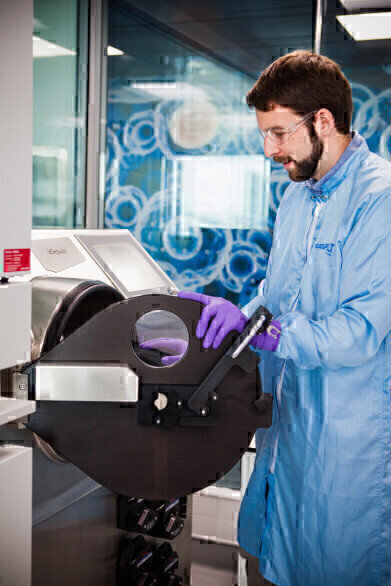News & views
Collaboration Investigates Potential of new Cell Immuno-Oncology Therapy
Jan 18 2016
The UK Cell Therapy Catapult, the University of Birmingham and Cancer Research Technology, the commercialisation arm of Cancer Research UK, are collaborating on development of new immuno-oncology cellular therapy based on gene modifying T cells to target solid tumours. Underpinning the project has been the launch of a new company, Chimeric Therapeutics Ltd, which will hold all future IP rights to the resultant discoveries.
Research being undertaken by Dr Steven Lee and Prof Roy Bicknell at the University of Birmingham, is progressing an academic discovery programme funded by Cancer Research UK based on a new generation chimeric antigen receptor T-Cell (CAR-T) immuno-oncology therapy for solid tumours. This involves directing the CAR-T cell towards a new, highly specific marker of tumour angiogenesis, CLEC14a. This therapy will act as a vasculature disruptive agent compromising oxygen supply to the tumours and inhibiting tumour growth. The technology is currently undergoing the final stages of preclinical development and is planned to enter into clinical trials soon after. The Cell Therapy Catapult will specifically be involved in the project to accelerate these translation discoveries towards a commercially available cell therapy.
“The Cell Therapy Catapult has extensive experience in working with early stage cell and gene therapies to develop them for clinical trial and commercialisation. We are delighted to assist Cancer Research Technology and Birmingham University to form this new company, Chimeric Technologies and apply this new CAR-T target to address solid tumours for the benefit of patients,” said Keith Thompson, CEO, the Cell Therapy Catapult. “The Cell Therapy Catapult looks forward to developing partnerships with other Cancer Research UK supported academic groups.”
“Scientists at University of Birmingham have demonstrated that these new engineered CAR-T cells exhibit anti-tumour effects and therefore have considerable potential as a therapy,” added David Coleman, Head of Spinout Portfolio, University of Birmingham.
Dr Phil L’Huillier, Cancer Research Technology’s director of business development, said: “This new partnership builds on a very successful relationship with the University of Birmingham. Immunotherapy is an exciting area in cancer treatment and this technology could provide a powerful route to harness the power of the immune system to block the development of blood vessels, and stop tumours growing.”
Digital Edition
Lab Asia 31.6 Dec 2024
December 2024
Chromatography Articles - Sustainable chromatography: Embracing software for greener methods Mass Spectrometry & Spectroscopy Articles - Solving industry challenges for phosphorus containi...
View all digital editions
Events
Jan 22 2025 Tokyo, Japan
Jan 22 2025 Birmingham, UK
Jan 25 2025 San Diego, CA, USA
Jan 27 2025 Dubai, UAE
Jan 29 2025 Tokyo, Japan



















